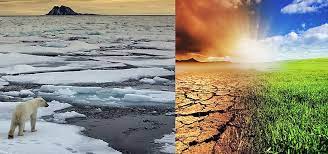Picture a coral reef struggling to survive as ocean temperatures continue to rise, leading to widespread bleaching events and loss of biodiversity. As you ponder the intricate dance between climate change and ecosystems, consider the cascading effects on marine life, coastal communities, and global food security. The interconnectedness of these systems unveils a complex tapestry of challenges and opportunities for conservation efforts and sustainable practices. Stay tuned to unravel the multifaceted impacts and potential solutions in the evolving narrative of climate change’s impact on ecosystems.
Impacts of Climate Change on Ecosystems
Climate change significantly alters ecosystems by affecting species distribution, habitat dynamics, and ecological processes. Biodiversity loss occurs as species face extinction due to shifting ranges and habitat loss. This loss impacts the intricate web of life, leading to reduced resilience and stability within ecosystems. The health implications of climate change on ecosystems are profound, with the spread of diseases and pathogens increasing due to changing environmental conditions. Habitat degradation exacerbates these issues, further threatening the survival of various species. To counteract these effects, resilience building measures are essential to enhance the ability of ecosystems to withstand and recover from disturbances. Community engagement plays a crucial role in implementing conservation efforts and sustainable practices to mitigate the impacts of climate change on ecosystems. By fostering collaboration and awareness, communities can work towards preserving biodiversity and promoting the long-term health of our ecosystems.
Ecosystem Services and Economic Effects
The profound impact of biodiversity loss and habitat degradation due to climate change necessitates a comprehensive examination of how ecosystem services and economic factors are intertwined.
Economic Impacts of Climate Change on Ecosystems
- Livelihood Concerns: Climate change impacts disrupt the livelihoods of communities dependent on industries like fisheries, agriculture, and tourism, leading to economic instability.
- Industry Vulnerabilities: Sectors relying on ecosystem services face vulnerabilities as changes in climate patterns affect resource availability and production processes.
- Adaptation Strategies: Implementing adaptive measures such as sustainable resource management, diversification of economic activities, and technological innovations can help mitigate economic losses.
- Ecosystem Valuation: Proper valuation of ecosystem services can provide insights into the economic benefits derived from nature, guiding policymakers and stakeholders in making informed decisions regarding conservation efforts and sustainable resource use.
Species and Population Changes
Changes in species composition within ecosystems can be attributed to various factors, including shifts in populations and interactions. Species adaptation plays a critical role in responding to climate change, with some species successfully adjusting to new conditions while others face extinction risks. Population dynamics are influenced by habitat loss, which can disrupt ecological balances and lead to declines in species numbers. Geographic shifts are evident as warming temperatures force species to move to different regions, impacting ecosystem structures. These changes in species and populations highlight the interconnectedness of ecosystems and the challenges they face in the wake of climate change. Understanding how species respond to these shifts is crucial for conservation efforts and ecosystem management. By studying the effects of climate change on species interactions and distributions, researchers can better predict and mitigate the impacts on biodiversity.
Timing Disruption of Natural Events
Disruptions in the timing of natural events within ecosystems can significantly impact the interactions and dynamics of species. These shifts in timing, influenced by climate change, can have profound ecological consequences. Here are some key points to consider:
- Phenological shifts: Changes in the timing of natural events like flowering, migration, and hibernation disrupt the delicate balance of ecosystem processes, affecting species’ life cycles and resource availability.
- Natural event disruption: Alterations in climate timing can challenge ecosystem resilience, leading to mismatches in predator-prey relationships, pollination dynamics, and food availability.
- Climate timing and biodiversity implications: Variations in the timing of events crucial for ecosystem functioning can impact biodiversity by affecting species’ abilities to adapt and survive in changing environments.
- Ecosystem cycles and adaptation challenges: Disruptions in natural event timings can pose significant challenges for species’ adaptation strategies, potentially leading to decreased reproductive success and survival rates.
These environmental impacts necessitate a deeper understanding of species responses to changing event timings to enhance ecosystem management and conservation efforts.
Environmental Justice and Equity Concerns
Environmental justice and equity considerations underscore the imperative for addressing disparities in climate change impacts across vulnerable communities. Inequity challenges arise as certain populations, including Indigenous communities, face disproportionate consequences from environmental changes. Social disparities exacerbate these effects, highlighting the need for targeted interventions to ensure fair treatment and inclusivity. Community resilience plays a crucial role in mitigating the impacts of climate change, emphasizing the importance of building adaptive capacities within marginalized groups. Environmental justice principles guide the identification of affected communities and the development of strategies to address their specific needs. Understanding the intersection of environmental issues with social and economic factors is essential for promoting equity in climate change responses. By acknowledging and acting upon these considerations, we can work towards a more equitable and just approach to safeguarding ecosystems and the well-being of all individuals.
Mitigation and Adaptation Strategies
In the realm of climate change impact mitigation and adaptation strategies, the focus shifts towards implementing proactive measures to address environmental challenges and foster resilience within ecosystems and communities. When considering the effects of climate change on ecosystems, it becomes imperative to develop and implement strategies that promote resilience building, sustainable practices, conservation efforts, biodiversity protection, and climate adaptation. Here are key strategies to consider:
- Resilience Building: Enhancing the ability of ecosystems to withstand and recover from the impacts of climate change through adaptive management practices and restoration efforts.
- Sustainable Practices: Implementing eco-friendly and resource-efficient methods to reduce environmental degradation and promote long-term ecosystem health.
- Conservation Efforts: Protecting and preserving natural habitats, species, and ecosystems through proactive conservation measures and habitat restoration projects.
- Biodiversity Protection: Safeguarding the variety of life forms within ecosystems to maintain ecological balance and resilience in the face of changing environmental conditions.
Regional Impacts and Studies
Studying specific regions such as Alaska, Hawaii, and the Arctic provides valuable insights into the impacts of climate change on ecosystems. Reports from the Intergovernmental Panel on Climate Change (IPCC) and other organizations offer critical information on regional climate impacts and biodiversity changes. Alaska studies reveal significant shifts in ecosystems due to rising temperatures, affecting wildlife and habitats. The Arctic, known for its rich biodiversity, faces threats to species like polar bears and Arctic cod as sea ice diminishes. Hawaiian ecosystems are experiencing disruptions in coral reefs and native species, highlighting the vulnerability of unique island ecosystems to climate change.
IPCC reports emphasize the urgency of understanding and responding to climate change impacts on agriculture, biodiversity, and ecosystems. The Arctic Climate Impact Assessment underscores the consequences of a warming Arctic on its delicate ecosystems. Observations of coral bleaching, wetland loss, and forest changes in different regions emphasize the need for proactive measures to mitigate climate change effects and protect ecosystem services.


